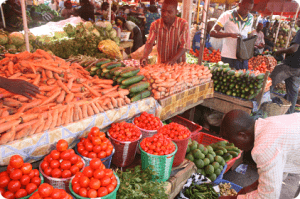…union officials deny allegations
Traders in many markets across Benin City, the Edo State capital, have lamented over the activities of unions in the markets, which they say are responsible for the high cost of items in the marketplace.
Prices of goods and services have been on an upswing across the country, occasioned largely by inflation which hit a 28-year high of 33.95 per cent in May 2024, up from 33.69 per cent in April 2024.
The rising cost of food items has been blamed largely on insecurity in some parts of the North, which has prevented many farmers in that region from accessing their farms.
In Benin City, however, traders across the markets in the city say there is an additional factor responsible for the high prices: the market unions.
“These market union officials often have their own fees and regulations, which can drive up the prices of goods, including tomatoes,” Mrs. Juliet Chukwuemeka, a cosmetic products trader at New Benin Market, told The Nigerian Observer.
“The unions impose various charges on traders, which in turn increase our overall costs. To cover these costs, we have to raise the prices of the goods we sell. This affects not only tomatoes but many other products in the market,” she said.
She called on the Edo State Government to set up a regulatory body to control the prices of goods in the market.
“We understand that prices are generally high, but in Edo State, they are even higher compared to other regions. A regulatory body could help ensure fair pricing and reduce the undue influence of unions,” she said.
A tomato seller in New Benin Market, who spoke on condition of anonymity, specifically mentioned the Oghomwen Union, which she said is an influential entity within the market that exerts significant control over who gets to sell tomatoes during regular market hours.
“If you are not part of the union, you cannot sell tomatoes in that market,” she lamented, emphasising that this stringent rule effectively bars non-union members from participating in the daytime trade.
As a result, tomato sellers who are not part of the union come to the market in the early evening, around 6:00-7:30 PM, to sell their goods, allowing them to earn a living without incurring the wrath of the union.
The Nigerian Observer research showed that this was not the first time that traders in the markets have cried out.
As recent as May 2024, a group of traders under the aegis of Traders’ Welfare Union of Nigeria marched to the Secretariat of the Nigeria Union of Journalists (NUJ), Edo State Council, in Benin City to protest the activities of the unions.
The protesters, bearing placards with various inscriptions such as “Edo people say no to evil unions in our markets” and “Evil unions in Edo markets are responsible for the hike in food prices”, blamed the hike in food prices across markets in Edo State on alleged illegal activities and deprivation they face from leaders of the market unions in the state.
President of the traders’ union, Comrade Lucky Orukpe, who spoke on behalf of the people, said the union was ready to expose illegal unions in Edo markets, whose activities in the markets were causing more harm than good.
He alleged that these unions compel traders to join their unions with exorbitant rates and items before selling their farm produce and goods.
“For those who bow to their evil union, there are restrictions on the size of produce to sell and days of trading in the market, such as once a week.
“And this clearly results in the artificial scarcity of farm produce, causing inflation and poverty for traders except the executives of the unions who can sell every day.
“Anyone who refuses to join the union faces conspiracy against them, arrest, and in most cases, their goods are seized by the leaders,” he said.
A fish seller and leader of the Amenze Social Club at Oba Market, Mrs. Elizabeth Christopher, popularly known as “Mama Caro”, however, told The Nigerian Observer that the primary motivation for establishing the fish sellers’ union was to protect its members from harassment while conducting their business.
“By setting up the union, we ensure that our members can sell their fish without being harassed,” she explained.
Mama Caro said to join the union, an individual must be introduced by a current member. Additionally, aspiring members are required to pay a fee of N10,000 and provide a crate of Malt drink. Following this, a prayer is conducted to welcome the new member. Members also pay a daily levy of N200 to the union.
She blamed the high cost of fish on the practices of some cold room outfits where they purchase fish, alleging that these suppliers often hoard fish and claim there is no stock available, thereby creating artificial scarcity which drives up demand and, consequently, prices.
“When they say there is no fish, it becomes scarce, leading to high demand and higher prices,” Mama Caro said.
When questioned about the role of unions in the rising prices of goods in the market, she emphasized that traders are in business to make a profit.
“Everyone does business for gain, not loss. You can’t expect a woman to sell from morning till night and not take anything home to her family,” she said, highlighting that many women are the primary breadwinners of their families. She illustrated the volatility of prices by citing an example where the cost of a carton of fish increased from N47,000 to N52,000 within a week.
The Nigerian Observer further gathered that strict regulations govern who can sell fish in Oba Market. The Amenze Social Club and the Bob Izua Club are the two fish unions in Oba Market and without membership in either of these clubs, individuals are prohibited from selling fish in the market. New members of the union are initially allowed to buy only two cartons of fish. Over time, they can purchase more as their membership progresses.
This, it was gathered, is to ensure that fish sellers are part of an organized group, which helps maintain order and standards within the market.
In addition to the fish sellers, other unions in Oba Market also play significant roles. The Osagioduwa union oversees the sale of tomatoes, with members paying a mandatory fee of N150 daily to the Oredo Local Government Area, The Nigerian Observer gathered.
Mrs. Stella, a member and tomato trader, emphasized that all market women, regardless of what they sell, must belong to a union.
She shared that within their union, members often lend each other money, thus fostering a sense of community and financial support among the traders.
She further noted that some of these women are widows with many children to cater for. Setting up the union is also a way of helping them so that they won’t have to resort to begging in the streets.
The Ebhaunegbe union governs meat sellers. According to the union’s secretary, who preferred to remain anonymous, membership requires introduction and mentorship by an existing member. This ensures that new members are well-trained before being formally introduced to the group.
She denied that the union contributes to price hikes, stating that prices are based on the costs at which they purchase their goods.
“We are in the market to make a profit, not to share our goods,” she said.
“To be a member of the meat union, there isn’t a specific amount they charge. The monetary requirement depends on the leader. However, a crate of Malt drink and Cabin biscuits is often mandatory, though the monetary part varies,” the secretary said.
“In times of personal crisis, such as illness or family emergencies, the union members often step in to provide support,” she said.


